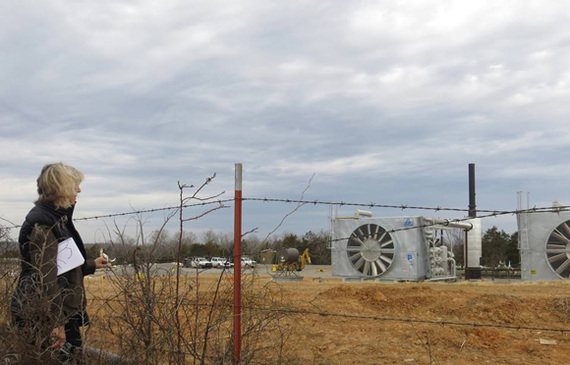The couple, married for decades, looked out along a rural dirt road that was home to no fewer than 27 fracked natural gas wells. Shaking their heads, they said they suffer from headaches, nosebleeds, nausea, hair loss and irritability. The cause of their health symptoms? According to them, they suffer from toxic air emissions from the wells and noise from the compressor stations.
Their doctors don't see it the same way. Their doctors blame allergies. But when this couple leaves the area for several days, the symptoms go away. "The air is so heavy," said one, who preferred not to be named. "It takes every ounce of energy you have to walk."
There are more than 5,000 natural gas wells in the Fayetteville Shale, an area that spreads across five Arkansas counties and is home to 200,000 people. The fracking and drilling of these wells may be harming nearby communities with toxic air emissions and associated traffic pollution.
Natural gas is an abundant natural resource across vast swaths of the U.S., and where gas is pumped out of the ground, toxic air emissions often follow. People are feeling the impacts in Wyoming, Ohio, Pennsylvania, Colorado and many other places -- like the Fayetteville Shale.
On a tour bus organized by Arkansasfracking.org, I joined with health professionals, community leaders and alternative energy activists from across the country. We traveled the short distance from college town Conway to Greenbrier and the Fayetteville Shale, passing through Guy (pop. 300), Quitman (pop. 762), and other tiny country hamlets.
The road stretched through winter fields dotted with cattle, horses, goats and dogs. Wooden fences separated small farmhouses from the road. Tree swings and American flags punctuated front yards. Interspersed in this iconic American landscape were natural gas well pads and compressor stations, and the heavy truck traffic servicing them.
At a compressor station in northern Faulkner County, we got out of the bus to look, from behind a wire fence, at the six enormous compressor units roaring like jet engines. Workers in hard hats walked around the site, tiny in the distance. The air smelled foul. I rubbed my head, wondering whether I had had my morning caffeine (I had). I felt a wave of nausea and wondered if I had eaten something funny (I had not). My throat burned as I wondered whether I had a cold coming on (I did -- but it never went to my throat). I rubbed my head again, trying to ease the splitting pain.
Back on the bus, a nurse visiting from Texas asked who was experiencing health symptoms. About half of us raised our hands, amidst the sound of people coughing and sniffling. My headache, nausea, and sore throat took around eight hours to clear up, and were completely gone by the next morning.
I can't know for sure whether toxic air emissions from the compressor station or nearby well pads caused my headache and nausea. But I was not alone in my experience, and it was correlated in time and place with being near the natural gas facilities.
My heart goes out to moms who live in these communities and have to watch their children and families suffer health effects. Local resident Tracy Wilson says, "It's the government's fault for letting a dirty industry do what it wants without any consequences."
This story is being played out in communities across the country. Where are the health professionals who can care for these communities? Where are the government officials who can step in to identify the problems and stop the fouling of our air? We need a national reckoning of the health impacts of fracking.
Air monitoring by community members around natural gas sites by Arkansasfracking.org has detected toxic emissions; results of the monitoring will be released this summer.
I'll share stories of some of the brave people who live in the Fayetteville Shale in a future post.
Photo: Elizabeth Crowe

